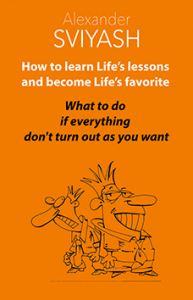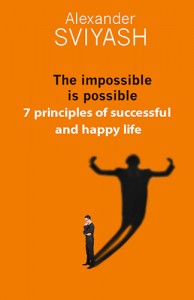Principle 2. Everything you have today you created yourself. Start rejoicing in your abilities as Creator now.
Being a martyr is very convenient – you can’t do anything. And what’s more something good
might come your way free of charge – we love losers.
No doubt you’ve met lots of people who love to imagine themselves unfortunate Victims of various circumstances. Maybe it’s your favourite pastime.
Whom might you be victim of? Anyone in fact. For example, victim of a vile husband (or equally of a horrible wife). Victim of callous children or of tyrannical parents.
Victim of a nasty boss or of negligent employees. Victim of a callous girl-friend or victim of dishonest people.
You might even be victim of yourself. How can that happen? For example, motivated by a rush of kindness, you make some sort of promise to other people. Then you have to carry out the promise. At that point you realize that you shouldn’t have made the commitment, but it’s impossible to change the situation. And you soldier on bitterly trying to keep your promise and feeling a victim of your commitment, that is, of yourself.
In the countryside, where people are not particularly self-reliant, a very popular pastime is sincerely claiming to be a victim of an evil eye or even a curse which bad people have put on you.
If you’ve been reading esoteric books, you might sincerely consider yourself a victim of bad karma. Or of life, which is supposed to be teaching you something, although you haven’t the foggiest idea what.
This is only a list of the most popular games with the theme: “I’m a victim, pity me”; from amongst millions of every conceivable type.
What’s bad about it?
What’s the problem with a person who has chosen victimhood as his life-principle? By making this choice, he has declared his total impotence to change anything. He has renounced his right to influence his own life, to direct it in some way, to change it for the better.
What does a victim have to do? He has to suffer. And wait for someone to come along and take away his suffering. He himself can’t do anything, apart from suffering torments and putting up with them.
People are super-perfect beings
And this is because we are blessed from birth with a super-perfect organism, which scientists have been studying for hundreds of years and whose possibilities they’ll be studying for a similar length of time. There are many actions which we all perform without giving it a thought which the whole of contemporary science is incapable of repeating.
You don’t believe it? Here’s an example involving the driver of a car. After you’ve been driving along the same route for a couple of weeks, a habit is set up (an habitual model of behaviour HMB), which begins to direct the movement of the car. In other words, you get behind the wheel, start the engine, and then that’s it: your consciousness can occupy itself with any thoughts it likes which have no connection with the journey. In the meantime, since you’ve already automated the process required by the journey along the standard route, your hands and feet direct the movement of the car superbly. A special programme (a neural configuration) directing the movement of the car has installed itself in your Subconscious.
And yet scientists throughout the world have been grappling for decades with the problem of automating a journey along a prescribed route, and today we have the first results – experimental cars, which can apparently travel in good weather and on good roads, but the electronics can’t yet handle the data-processing required when it’s raining or snowing. But with you the problem of automating the movement of the car sorts itself out in a week. Just think how superior the potential of your brain is to that of the whole of contemporary cybernetics!
And you still consider yourself to be a defective creature…
A victim can’t do anything himself
So, given that you consider yourself to be defective and powerless, you are compelled to look for some sort of Guru, Teacher, healer, or other person who specializes in solving other people’s problems, to rescue you from your misfortunes.
In other words, when you see a crowd of people filling a stadium in search of a cure or karma-cleansing, you should understand that all these people are convinced that they can’t change anything themselves, that they have firmly ensconsed themselves in the role of victim.
And the position of the victim is nothing more than a conviction of the type “I can’t do anything about this. It’s beyond me. I’ll have to find someone to help me”, which has been stored in the Subconscious of every one of these people.
It’s not karma, or an evil eye, or a curse or any other philosophy of impotence devised by people. It’s nothing more than a negative conviction which has been stored in the Subconscious, programming the person to behave as an imperfect human being.
Moreover, you can be super-self-confident in your profession, for example, but at the same time you might take up a position of total powerlessness when it comes to relations between men and women, or health.
As you already know from the previous chapter, if desired, you can easily change these programmes of powerlessness by using the appropriate instruments.
What a clever dick we have here!
Understandably, many people will strongly object on reading these lines: “How can he say that I’m doing nothing and just waiting for a saviour? No, I’ve been to a doctor (healer, psychotherapist, shaman, Teacher, etc.), to sort out my problem. I’m trying, it’s just that I’m not having any success.”
Here the question arises: but why have you gone to these specialists?
People-victims always have the same request: “Doctor, I can no longer live with my sick body and my wounded soul. Do something about them”
There’s another form of question I’ve never heard, for example, like: “Doctor, it seems that because in some way I haven’t been living my life correctly, I’ve ended up with colitis, cystitis, radiculitis and just about every other shittyitis there is. How should I change my way of thinking and behaving so that I can be healthy and happy?”
It has to be said that most doctors and healers would be at a loss to respond to such a question – they’re not ready to cope with patients who take responsibility for their ailments. They’re used to person-victims asking them to take away their ailments, which have somehow befallen them and which they themselves can’t deal with.
And indeed, they’ve never tried to deal with them. They’ve just turned up in order to be the recipients of some sorts of rituals or procedures which will solve their problems. And then they’ll just continue with their former way of life.
Does this remind you of yourself?
Do you intend to cling on remorselessly to this position? In that case, you can confidently close this book, it won’t be any help to you. And look for another book which describes some sort of miracle-worker, whom you’ll urgently rush off to in order to get him to sort out your misfortunes. And then another problem will arise and you’ll rush off to find another specialist, and so on, for the rest of your eventful life.
Who’s this book for?
It’s worth someone continuing to read this book if he’s ready to take on himself responsibility for what happens to him, and admit that the situation he’s ended up in today is the result of his inner convictions and the actions which flow from them.
In other words, you have to admit that the reality in which you live today has somehow or another been created by you yourself.
Probably you don’t fully understand how you’ve managed to generate all the things which poison your life today – that’s normal. No one has taught you how to understand that process.
We’ll try and do that together.
Let’s look for the architect of your misfortunes
Let’s say you’re having difficulties in your relations with the person closest to you – your husband (or wife). Or with the one you love, whom you haven’t yet succeeded in getting to the Registry Office. He drinks (is jealous, chases after other women, doesn’t help, doesn’t speak words of love, doesn’t give you money, or whatever), and this really annoys you. You might wonder how you could have brought all that about yourself?
You already know from the first principle that your struggle for any ideas, however brilliant they might be, necessarily generates a counter struggle.
Maybe it’s you who, acting from the best of motives, have provoked your loved one into such an unbridled struggle against you?
Probably it’s unpleasant for you even thinking about this. Surely you’re all soft and white, you’ve even got angel wings, how could you possibly have ruined anything? It’s out of the question. It’s he who’s ruined himself, you’re just struggling to save him.
It has to be said that this does actually happen, but quite rarely. That is, there are situations where you yourself have not created the conflict, but your loved one has in fact drastically changed (with age, change in place of work or interests, etc.). Probably, he’s always displayed his less desirable qualities, but it’s escaped your attention. Because being in love is unconscious concentration on the virtues of the beloved whilst totally ignoring his inadequacies [A Sviyash I. Nyezovibatko. Sex as joyful psychotherapy for the mature ].
And so you too, afflicted by a love-induced paralysis of your capacity for rational thought, have been living in a fantasy-world. And then, when this rapture has died a natural death, and your eyes are opened, you lapse into a state of chronic dissatisfaction with your choice.
This does happen, but all the same you were not a victim of circumstances, but a person who made a decision about creating a relationship whilst in a state bordering on narcotic. And that, as we know, does not absolve you of your responsibility for what has happened. You brought this result about yourself.
Or you have a protracted conflict with one of your children, irrespective of his age. You consider that you are responsible for him. And you do everything in your power to make his life good. But for this he has to create a life which you consider to be the best.
So, pursuing this brilliant and, for you, very important goal, you do everything in your power to force the child into your purported Paradise. Naturally, he resists, which arouses your anger. The conflict grows, relations between you are damaged. You obviously feel yourself a victim of your intolerable child, who just does everything to spite you.
In other words, you yourself have created the very relations with the child which you find totally unacceptable. It’s time to go to someone who can sort all this out.
Or let’s take the situation of of a protracted conflict between quite grown up children and their parents.
Let’s say you’re a child suffering the intrusive attentions of your parents and feeling yourself a victim of their arbitrary authority. Ask yourself the question: how is it that in most other families, children have managed to form more harmonious relations with their parents? But you haven’t…
Or let’s take your issue with your job or what you earn from it. It’s possible the content of the work is not to your liking (too boring, monotonous, nerve-racking, etc.). Or the amount you get paid. And you’ve been hung up on this dissatisfaction for many years. You consider that management doesn’t pay you your due, doesn’t value you, and get absorbed in an energy-consuming inner struggle. It turns you into a totally impotent human being, who is unable to find the strength to change the situation. You choose to engage in struggle and sincerely consider yourself a victim of cruel circumstances. Probably you see your approaching pension as something which will release you from the torture.
It’s possible that your situation is not as dire as that described above and that there are many problems that you don’t duck, but sort out yourself. But nonetheless there are times when situations arise in which you lose heart and feel totally impotent. It happens to
everyone, that’s normal. The important thing is not to get stuck in that state for years or decades.
What should you do?
How should you act in situations which you find unacceptable?
It’s very simple. Forbid yourself from moaning or complaining about your harsh fate or cruel circumstances or such like.
And admit that you’ve brought it all about yourself.
You yourself have created your present relationships. You receive the income for which you have agreed to sell your labour. Your health is the result of your attitude to the needs of your body, and so on.
Rejoice in the fact that you create your own life. You are the real Creator of everything that happens to you.
Start to be proud of this.
Moreover, the worse your present circumstances, the more reasons you have for taking pride in yourself: you have approached your life very creatively and created for yourself the most wonderful conditions for inner growth.
In other words you have the possibility of striving for something: the immense satisfaction resulting from those positive changes which you are able to bring to your life.
It’s important just to start these changes and not slip into despair or fear, and not rush off in search of another saviour.
Only you can make the choice of which path to follow.
Precisely because of this, the second principle says: start right now rejoicing in your abilities as Creator.
This of course is not enough to extricate yourself from your situation in the best way – you will have to act. But not act as victim, rather as Master of your destiny who has gone somewhat astray in his strivings. But he still chooses to be positive and remain so, whatever happens to him or around him.
It’s not simple, but it’s possible.
There is no other way for you to achieve a successful and happy life. A foreign guru might reassure you and distract you with arguments about some sort of different life, but he can’t solve your problems or realize your goals for you.
This is your task.
So once again take a deep breath, relax and feel joy at the chaos you’ve managed to create for yourself.
And start to look for the tools you need to change your reality in the way you desire. Changing won’t just take an hour or a week, probably more like months or years. This will be a time of searching, discoveries and inner changes. And the result will be the feeling that you are capable of constructing and not just destroying.
And that is worth a great deal.
If you are prepared to “squeeze the slave out of you drop by drop”, as A.P. Chekhov put it in his time, and gradually become “Master”, then, so as not to invent everything from scratch, you can follow out the recommendations of this book. But not just this.
You can and must make use of help
The above discussions in no way imply that the author does not recommend consulting doctors, psychologists, trainers and other specialists, of course not. Consulting them is very useful, as they can give you the benefit of experience and knowledge which would take you more than a life-time to acquire.
The other question is what methods they use and what your role is in the process of their work.
An example of a popular method is Hellinger Placement. If you manage to find a good specialist in this, you might solve your problems quickly (not necessarily of course). In the course of placements you will be positioned in accordance with the instructions of the instructor and say what you feel. That is, in this process you will play the role of a clod and be unable after the placement to do anything similar independently.
If you need to sort out your problem as quickly as possible and it doesn’t concern you how the problem arose, then placement therapy would be suitable for you. But there’s absolutely no guarantee that the problem won’t recur, since you haven’t understood how the problem was created.
Or take another popular method, NLP (Neuro-linguistic Programming). In this the person is usually treated as an object on which the specialist carries out various procedures.
The method effectively relieves a person of many fears and other problems, but afterwards he is unable to repeat any of it himself, since he is merely an object who has been manipulated. This is the usual approach in work with people who don’t wish to take responsibility for what happens in their lives.
But NLP does also contain lots of tools for those people who want to take control of what happens in their lives. This side of NLP is taught in various training courses.
Since most people adopt the position of victim, the methods of intervention are basically aimed at them.
The author of the present book is developer of the method called “The Rational Way”. It’s primarily aimed at people who wish to understand the reasons for events taking place in their lives, and then consciously build their lives in such a way that only the events they need take place.
You are the true Creator, so create your life consciously and without error.




